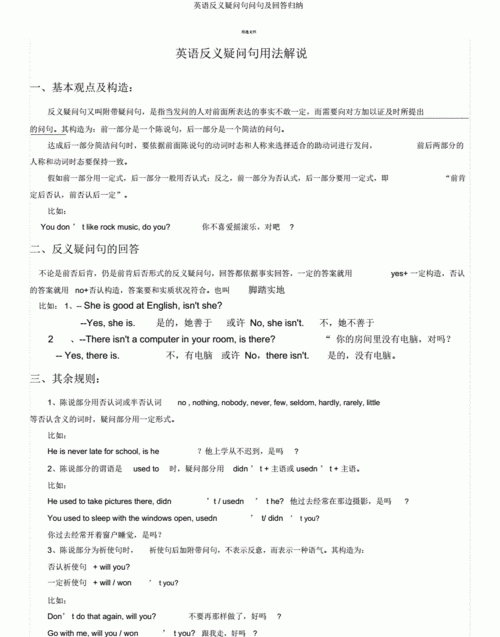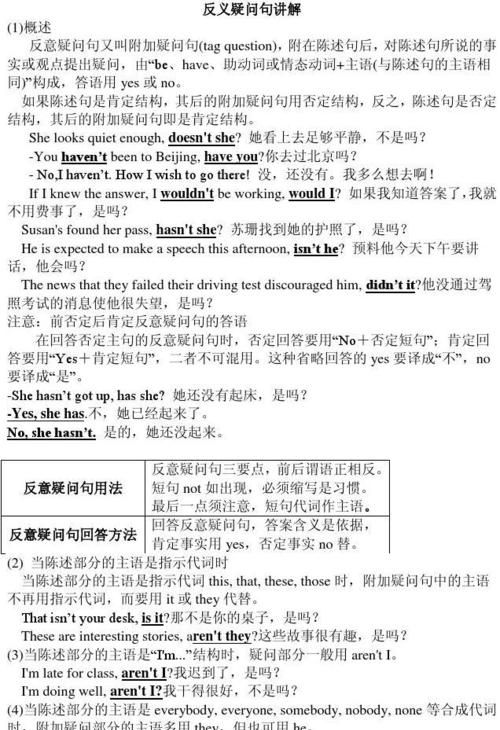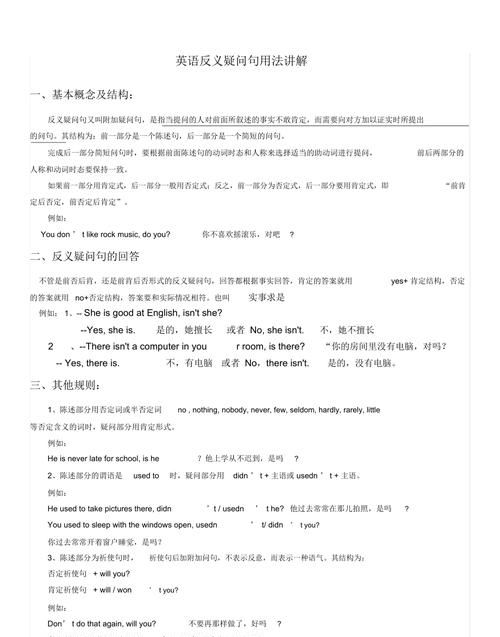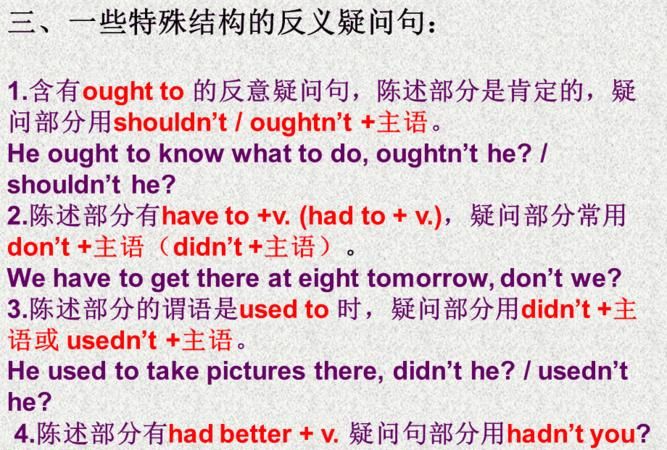本文目录
英语翻译
前半句有no,后半句用肯定。
填:is there?
要点1. There be 句型中,反义疑问部分必须为be 动词 + there
要点2. 反义疑问句简单来说,就是“前肯后否”或“前否后肯”。

英语中的反义疑问句要注意哪些方面的问题
1.陈述部分肯定式+疑问部分否定式
可记为
前肯后否
2.陈述部分否定式+疑问部分肯定式
可记为
前否后肯
注意:
(
1
)用
one
时,后面的疑问句可用one/he.
(2)everything,anything,nothing,something时,
附加疑问句中主语用it
不用
they
(3)this,that,或those,these时,附加疑问句中主语用it和they.
(4)everyone,everybody,someone,somebody等,附加疑问句中主语一般用he/they.
(5)不定式,动名词,其他短语,附加疑问句中主语一般用it。
(6)在there
be句型中,附加疑问句中主语一般用be/情态动词/助动词+there。
请见
***/view/1656124.htm

英语反义疑问句怎么改
一、英文中的反意疑问句。
1、什么是反意疑问句
英语中,反意疑问句是由陈述句和附在其后的附加疑问句组成。其中附加疑问句是对陈述句所说的事实或观点提出疑问,起证实作用,一般用于证实说话者所说的事实或观点。翻译为“是吗”
2.反意疑问句的回答,回答时,如果情况属实,用Yes加上反问句的倒装肯定句;若果情况不属实,则用No加上反问句的倒装否定句。例如
You were moved by your students, weren’t you?
情况属实:Yes, I were.
情况不属实:No, I weren’t.
二、反意疑问句中问句部分的动词与陈述部分的动词在语气上成相反的对应关系,即:肯定+否定? 否定+肯定?如:
① You can’t do it, can you?
你不能做它,是吗?
②They are very late for the meeting, aren’t they?
他们开会迟到了,是吗?
三.当陈述句中含有be动词,助动词,或是情态动词时,反问句部分由这些词加上主语人称代词构成,
Be动词包括:am, is, are, was, were
助动词有:do, does, did, have(用在完成时), has(用在完成时)等
情态动词有:can, could, may, might, must, will, would, shall, should
例如:
She is a lovely girl, isn’t she?
她是一个可爱的女孩,是吗?
He will go home, __won’t__ __he__?
他要回家了,是吗?
She doesn’t like to eat popcorn, __does__ _she___?
她不喜欢吃爆米花,是吗?
The baby won’t sleep early, will it?
小宝宝睡得不早,是吗?
注意:①He has supper at home every day, doesn’t’t he? (不能用hasn’t he?)
他每天在家吃晚饭,是吗?
② They have known the matter, haven’t they? (不能用don’t they?)
他们已经知道那事情了,是吗?
四.当陈述句中只含有行为动词时,若动词加了s,就用does, 若动词为原形,就用do,动词为过去式,则用did,例如:
You cleaned your house last week, _didn’t___ __you__?
你上周打扫了你的房间,是吗?
Your father plays the computer very well, __doesn’t__ ___he _?
你父亲电脑技术很好,是吗?
They look so happy today, _don’t ___ _they___?
你今天看起来很高兴,是吗?
五.反意疑问句的陈述部分带有little, few, never, hardly, seldom,nobody, nothing, barely, scarcely等否定意义的词时,问句部分用肯定式。如:
①She never tells a lie, does she?(不用doesn’t she?)
她从不说谎,是吗?
②He was seldom late, was he?(不用wasn’t he?)
他几乎不迟到,是吗?
六、反意疑问句的陈述部分为I am……时,问句部分习惯上用aren’t I?表示。
如: I am a very honest man, aren’t I?
我是个很诚实的人,是吗?
七.陈述部分的主语为不定代词something, anything, nothing, everything时,问句部分的主语用it。如:
①Something is wrong with the computer, isn’t it?
电脑有问题了,是吗?
②Nothing has happened to them, has it?
他们什么事也没发生,是吗?
八、陈述部分的主语为不定代词somebody (someone), anybody (anyone), nobody (no one), everybody (everyone)时,问句部分的主语用he或 they,这时问句动词的数应和he或 they一致。如:
①Someone has taken the seat, hasn’t he?
有人已经坐了位置,是吗?
②Everyone has done their best in the game, haven’t they?
每个人在比赛中已经尽力了,是吗?
九.陈述部分为祈使句
1)若为let’s引导,反问句用shall we? 例如
Let’s go home together, shall we? 让我们一起回家,好吗?
2)若为let us引导 和其余的任何一般的否定祈使句,都用will you, 例如
Let us stop to rest, will you? 让我们停下休息,好吗?
Don’t make any noise, will you? 别弄出噪音,好吗?
3)一般的肯定祈使句则用will you 或won’t you 都行,例如:
Do sit down, won’t you?/ will you? 请坐,好吗?
You feed the bird today, will you? 今天你喂鸟,是吗?
Please open the window, will you? (won’t you?) 打开窗,好吗?
十:陈述部分为There (Here) + be + 主语时,问句部分用动词+there (here)?形式。
①There are two cakes on the plate, aren’t there?
碟子里有两块蛋糕,是吗?
②Here is a story about Mark Twain, isn’t here?
这是关于马克吐温的故事,是吗?

英语反义疑问句的用法归纳
英语反义疑问句用法讲解
一、基本概念及结构:
反义疑问句又叫附加疑问句,是指当提问的人对前面所叙述的事实不敢肯定,而需要向对方加以证实时所提出的问句。其结构为:前一部分是一个陈述句,后一部分是一个简短的问句。
完成后一部分简短问句时,要根据前面陈述句的动词时态和人称来选择适当的助动词进行提问,前后两部分的人称和动词时态要保持一致。
如果前一部分用肯定式,后一部分一般用否定式;反之,前一部分为否定式,后一部分要用肯定式,即“前肯定后否定,前否定后肯定”。
例如:
You don’t like rock music, do you? 你不喜欢摇滚乐,对吧?
二、反义疑问句的回答
不管是前否后肯,还是前肯后否形式的反义疑问句,回答都根据事实回答,肯定的答案就用yes+肯定结构,否定的答案就用no+否定结构,答案要和实际情况相符。也叫实事求是
例如:1、--She is good at English, isn't she?
--Yes, she is. 是的,她擅长 或者No, she isn't.不,她不擅长
2、--There isn't a computer in your room, is there?“你的房间里没有电脑,对吗?
-- Yes, there is.不,有电脑 或者 No,there isn't.是的,没有电脑。
三、其他规则:
1、陈述部分用否定词或半否定词 no , nothing, nobody, never, few, seldom, hardly, rarely, little等否定含义的词时,疑问部分用肯定形式。
例如:
He is never late for school, is he?他上学从不迟到,是吗?
2、陈述部分的谓语是used to 时,疑问部分用didn’t +主语或 usedn’t +主语。
例如:
He used to take pictures there, didn’t / usedn’t he? 他过去常常在那儿拍照,是吗?
You used to sleep with the windows open, usedn’t/ didn’t you?
你过去常常开着窗户睡觉,是吗?
3、陈述部分为祈使句时,祈使句后加附加问句,不表示反意,而表示一种语气。其结构为:
否定祈使句 + will you?
肯定祈使句 + will / won’t you?
例如:
Don’t do that again, will you? 不要再那样做了,好吗?
Go with me, will you / won’t you? 跟我走,好吗?
注意:
Let’s 开头的祈使句,后用shall we?
Let us 开头的祈使句,后用will you?
例如:
Let’s go and listen to the music, shall we? 让我们去听音乐,好吗?
Let us wait for you in the reading-room, will you? 让我们在阅览室等你,好吗?
4、如果陈述句部分的谓语含有带否定前缀dis-, un-, im-或否定后缀-less的词(dislike, discourage,be unfair/ untrue/ unable, etc.),仍按肯定句处理,其反问部分一般用否定式。
例如:
It’s unfair, isn’t it? 不公平,是吗?
You dislike it, don’t you? 你不喜欢它,是吗?
The patient is unable to move round, isn’t he? 这个病人不能到处走,是吗?
5、陈述部分的主语是I,疑问部分要用 aren’t I。
例如:
I’m late for the meeting,aren’t I? 我开会迟到了,是吗?
6、陈述部分主语是指示代词或不定代词everything, that, nothing, this时, 疑问部分主语用it。
例如:
Everything is ready, isn’t it? 一切都准备好了,是吗?
7、如果陈述部分的主语是不定代词someone(body), anyone(body), everyone(body), no one, nobody 等,由于它们是第三人称单数并且指代人,其反问部分的主语可以是they,也可以是泛指第三人称单数的he。
例如:
Everyone passed the exam, didn’t they / he? 每个人都通过了考试,是吗?
Someone is coming, aren’t they / isn’t he? 有人来了,是吗?
8、陈述部分是“there be”结构的,疑问部分用there。
例如:
There’s not much news in today’s newspaper, is there? 今天的报纸上没有什么新闻,是吗?
9、含有宾语从句的反义疑问句:
当陈述部分带有宾语从句时,疑问部分的主语应与主句的主语保持一致。
例如:
He said that he would come to my birthday party, didn’t he?
他说他会来参加我的生日聚会,是吗?
但当主句是:I think, I believe, I suppose, I except, I imagine等结构时,疑问部分的主语和谓语动词应与宾语从句的主语和谓语保持一致。
例如:
I don’t believe he will succeed, will he? 我不相信他会成功,是吗?
He doesn’t believe he will succeed, does he? 他不相信他会成功,是吗?
10、陈述部分含有must的反义疑问句:
当must作“必须”讲时,其翻译疑问部分用needn’t;当含有mustn’t(不允许,禁止)时,其反意疑问部分用must/ may。
例如:
You must go now, needn’t you? 你必须走,是吗?
You mustn’t smoke here, must/may you? 你不可以在这里吸烟,对吗?
11、感叹句中,疑问部分用be +主语。
例如:
What beautiful flowers, aren’t they? 多漂亮的花呀,不是吗?
12、陈述部分有You’d like to +动词原形,疑问部分用wouldn’t +主语。
例如:
You’d like to go with me, wouldn’t you? 你想跟我一起去,是吗?
13、陈述部分有would rather +动词原形,疑问部分多用 wouldn’t +主语。
例如:
He would rather stay at home than go out, wouldn’t he? 他宁愿呆在家也不愿出去,是吗?
14、陈述部分有have to +动词原形 (had to + 动词原形),疑问部分常用don’t +主语(didn’t+主语)
例如:
We have to write it with a pen, don’t we? 我们必须要用钢笔填写,是吗?
15、陈述部分有had better + v.疑问句部分用hadn’t you?
例如:
You’d better read it by yourself, hadn’t you? 你最好自己看,好吗?
16、带情态动词dare或need的反义疑问句,疑问部分常用 need (dare ) +主语。
例如:
We need not do it again, need we? 我们不需要重做,是吗?
He dare not say so, dare he? 他不敢如此说,是吗?
当dare, need 为实义动词时,疑问部分用助动词do + 主语。
例如:
She doesn’t dare to go home alone, does she? 她不敢独自回家,是吗?
巩固练习
一、完成下列反意疑问句, 每空一词。
1. We must go at once, _____________________?
2. My uncle used to smoke, _____________________?
3. She is a music lover, _____________________?
4. You need to have a good dictionary, _____________________?
5. Let us do the jobs ourselves, _____________________?
6. There used to be an old stone bridge across the river, _____________________?
7. Please turn down the radio, _____________________?
8. There were few people there, _____________________?
9. If anybody comes here, he will be welcome, _____________________?
10. I am late for the meeting, _____________________?
二、把下列各句改成反意疑问句。
1. I think he is right.
____________________________________________________________
2. I don’t think you’re seriously ill.
____________________________________________________________
3. I don’t suppose they will be back soon.
____________________________________________________________
4. Don’t do such a job.
____________________________________________________________
5. You needn’t do that when your daughter is here.
____________________________________________________________
6. What you need is more practice.
____________________________________________________________
7. He says that it is really true.
____________________________________________________________
8. He dared to ask the teacher many questions.
____________________________________________________________
9. That is an honest girl?
____________________________________________________________
10. Tom hasn’t much time to spare.
____________________________________________________________
三、单项选择。
1. An elephant is strong, _______ it?
A. doesn’t B. does C. isn’t D. is
2. You are new here, _______you?
A. aren’t B. are C. do D. don’t
3. Martin is good at fishing, _______?
A. is he B. does he C. isn’t he D. doesn’t he
4. The little dog is lovely, _______?
A. isn’t it B. is it C. isn’t the dog D. is the dog
5. Mr. Brown met Mrs. Wang yesterday, _______?
A. does he B. doesn’t he C. did he D. didn’t he
一、完成下列反意疑问句, 每空一词。
1. needn’t we
2. usedn’t he/didn’t he
3. isn’t she
4. don’t you
5. will you
6. usedn’t there/didn’t there
7. will you/won’t you
8. were there
9. won’t he
10. aren’t I
二、把下列各句改成反意疑问句。
1. I think he is right, isn’t he?
2. I don’t think you’re seriously ill, are you?
3. I don’t suppose they will be back soon, will they?
4. Don’t do such a job, will you?
5. You needn’t do that when your daughter is here, need you?
6. What you need is more practice, isn’t it?
7. He says that it is really true, doesn’t he?
8. He dared to ask the teacher many questions, didn’t he?
9. That is an honest girl, isn’t it?
10. Tom hasn’t much time to spare, has he?

以上就是关于反意疑问句的易错点英语 ,英语翻译的全部内容,以及反意疑问句的易错点英语 的相关内容,希望能够帮到您。

